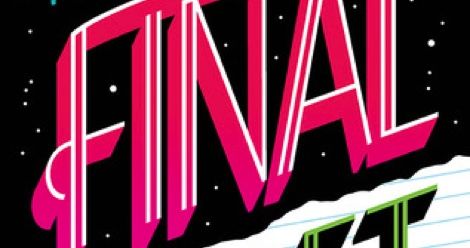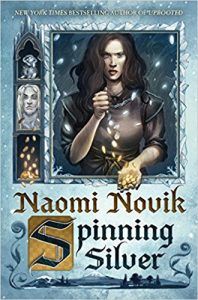
Fan Fiction, Fantasy, and FINAL DRAFT with Author Riley Redgate
I sat down (virtually) with Riley Redgate, author of acclaimed YA books like Seven Ways We Lie and Noteworthy. Just this June, Redgate came out with a fantastic novel (one of my favorite YA picks of the year!) called Final Draft. Here, we talk about everything from her latest book to her favorite fan fiction.
 Describe your new novel, Final Draft, in 10 words or less.
Describe your new novel, Final Draft, in 10 words or less.
Perfectionist writing student becomes obsessed with impressing hypercritical new teacher.
I adored Final Draft, whose main character felt JUST like me. When did you first see a protagonist in a novel that reminded you of yourself?
Thank you! Oh, this is a tough question. Like every bookish girl, I saw myself in Hermione Granger, and like every wisecracking smartass, I saw myself in Percy Jackson. But it wasn’t until I read Heidi Heilig’s The Girl from Everywhere that I realized how it might feel to read about a main character who’s half-Chinese and struggling to find where she belongs, a book that acknowledges the attendant preoccupations of being mixed-race. Previously, I’d read characters who shared tastes or personality traits with me, and recognized myself that way—but Nyx was the first character who I could engage with on a meta level: I could imagine myself cast as her in a movie; I could participate in self-insert fan-connection in a way I hadn’t realized had been beyond me in the past. Both ways of self-recognition are important and I do wish I’d had the latter earlier.
What was the last fantastic book you’ve read?

Why do you write young adult fiction?
Many reasons! First of all, although I’m open to writing MG or adult, most of my concepts just seem to fit better as YA books. Secondly, I love the community—the passion and enthusiasm that YA readers have for the genre is second to none. Thirdly, there’s a wonderful feeling of universality to YA. Not to pit literary fiction and YA against each other, but as much as I adore and admire literary fiction, I think the best YA is not only just as compelling but also more accessible, which feels important to me in an age where 25% of the nation hasn’t read a single book in the last year. Sometimes people say “commercial” like it’s a dirty word, but all that means to me is that a higher quantity of people get to enjoy a story, and they get to do it together.
If you could only read one genre for the rest of your life, what would it be?
Fantasy was my first love and remains the genre that most excites me, both to read and to write. Every time I think I’ve found restraints or confines within fantasy literature, something new comes along to explode them, like the apocalyptic megascale of N.K. Jemisin’s The Fifth Season or the intimate, literary musicality of Melissa Albert’s The Hazel Wood.
Where did you get the idea for Laila, the protagonist of Final Draft? Is she inspired by anyone or anything?
Final Draft is sort of a response to one of my favorite movies, Whiplash. I’ve always loved stories about obsessions and obsessives, so Laila is my addition to that long line of tortured artist protagonists. But obsessive artist narratives, Whiplash especially, tend to posit a question of “Will you suffer and succeed?” OR “Will you prioritize your comforts and fade into obscurity?” With Final Draft, I wanted to offer another take on the question itself: “What if suffering does not actually yield great art, and what if happiness is not antithetical to its creation?” I think art is more complex than popping in unhappiness coins until genius emerges, and with Laila I wanted to create somebody who starts off believing in that dichotomy, as a lot of people seem to, only to have it questioned.
Do you ever get pushback for trying to write and publish characters with queer or other marginalized identities?
I’m lucky to reply with an emphatic no! When I went on submission with my agent (Caryn Wiseman, actual angel), she was open and enthusiastic about the diverse characters in my stories from the outset, and it was never an issue. I think we’re seeing a change in the way books with queer & POC characters are discussed: eagerly, now, as opposed to with trepidation for how these elements might impact sales.
8. Last but not least—did you ever write fan fiction?
Oh, for sure. Many hundreds of thousands of words of it, mostly Harry Potter fic. I have a lot of Opinions about fan fiction! First of all, I think some books/stories lend themselves to fic better than others. George RR Martin is well-known for being anti–fan fiction, and I wonder if this is because A Song of Ice and Fire would be, IMO, incredibly hard to write truly great fan fiction for. I have never tried and think I would die in the attempt.
I also think fic-writing requires an adjacent skillset to the one that original fiction requires. There are obviously the general building blocks of writing beautiful sentences, characterizing people competently, establishing a coherent plot, and all the other stuff that’s contradicted by the infamous My Immortal. But it’s easier to go wrong with fan fiction because you’re working within pre-established boundaries. There’s a constant sense of dramatic irony—you’re writing to this audience that has a ridiculously specific sense of what is correct and incorrect in your work. That’s part of the fun, playing around with expectations and shattering them in a way that’s satisfying rather than frustrating, but it’s also something I never think about with writing books. Maybe this is because I’ve never written a sequel.
In general, I think it’s just as tough to write great fan fiction as it is to write a great novel, not least because you don’t get paid and you’re running on the sheer manic love of the thing. It’s also harder to find the great stuff, because there’s no paid system of quality control, no internet equivalent of the publishing industry. Besides word of mouth, the best you can do is “sort by most reviews,” which is…uh, unreliable. Anyway, several of my favorites are [editor’s note: some of these are NSFW] Fixer Upper, Harry Potter and the Methods of Rationality, Skirt Full of Thorns, and Do Not Disturb. (And okay, why not, here’s one of mine—toxicology.)
Thank you so much for having me!

















